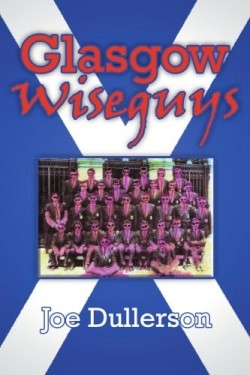Glasgow Wiseguys
The Loch Ness monster stone castles cobblestone alleyways and plaid kilts often come to mind when one thinks of Scotland. Joe Dullerson doesn’t bother with such worn familiar images; he goes for the gut and the guttural in his novel Glasgow Wiseguys which explores the seedy side of Scottish life through characters who are awash in misery and looking for someone else to blame.
Glasgow Wiseguys is written in three parts: “Glasgow Wiseguys” “Glasgow Wiseguys Over the Top” and “Glasgow Wiseguys Out of Order.” In the first section a first-person narrator Joe Dull muses on his childhood and young adulthood his passage through the church his imprisonment in his parents’ home and his illusionary freedom through drugs alcohol and sex. The second section follows the disastrous love lives of men who cannot seem to figure out how to cope with women. The third part seems to be about a man’s psychotic breakdown and eventual death; the first person narrator returns in the last chapter to reflect on the city in which he grew up and the ways it’s changed. A running commentary about Nazism and the Holocaust connects the three sections.
It’s difficult to be certain about the book’s plot because the writing offers so little context; the narrative slings out descriptions of bad relationships boozy nights and psychotic ramblings without inviting any interpretation. The style of writing may be a reflection of the mental imbalance a few of the characters display in the book but there is nothing to contrast and define this style. There’s no explanation about why the book is populated by these scenes.
Dullerson certainly has the ability to make readers feel revolted. He excels at popping out turns of phrase that shed dazzling spotlights on particularly nasty moments of drama. One of the more tame examples: “The Glasses gave off a pungent odour just like the Mersey that was quite stimulating until he came to a squelchy orgasm.” Dullerson handles his sentences with aplomb but when it comes to constructing a book he fumbles and leaves readers wondering what exactly is happening between the pages.
Perhaps if Dullerson had made a few of his characters sympathetic and amicable readers would have less trouble committing to such lengthy descriptions of bad sex painful miscommunication and whiny self-pity. As it is not one of the many names mentioned sparks an iota of affinity. When Hector McKay “received 30000 volts into his frontal lobes that had induced death through heat seizure” it’s more of a relief than a loss.
Dullerson has talent but his voice in Glasgow Wiseguys is little more than stream-of-consciousness ramblings. His next novel might offer a discernible plot characters to care about and a few moments of sunshine to cut through the relentless bleak midnight of the soul.
Disclosure: This article is not an endorsement, but a review. The publisher of this book provided free copies of the book and paid a small fee to have their book reviewed by a professional reviewer. Foreword Reviews and Clarion Reviews make no guarantee that the publisher will receive a positive review. Foreword Magazine, Inc. is disclosing this in accordance with the Federal Trade Commission’s 16 CFR, Part 255.

